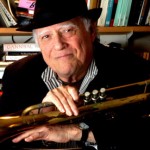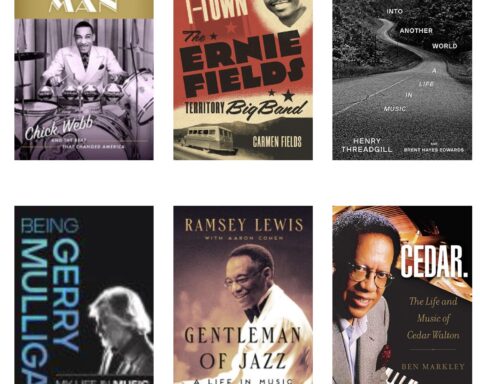 For decades Mike Zwerin was the significant American in Paris for a floating readership of world travelers and settled expats, ready with the word about music, delivered in an idiom of cosmopolitan verbal swing on the back page of the International Herald Tribune four or so times a month. In the days before the web he was the fastest friend an American could make abroad. Even if you weren’t a fan of jazz — Zwerin’s principal but far from only music — he was one of the pleasures of taking to the air and landing someplace different.He died in Paris in the early hours of April 2, 2010, six weeks short of what would have been his 80th birthday. One French newspaper had a keen eye for detail and remembered him as the guy sitting in the back of every dark jazz club in the City of Light, handsome well into his 70s, unlined face and assertive jaw beneath the trademark black fedora, and not a listener to take lightly: the only jazz critic — which he wasn’t, really — to have played with the likes of Miles Davis, John Lewis, Max Roach, Thad Jones, Elvin Jones, Eric Dolphy, Richard Davis and Connie Kay without sounding out of his league.
For decades Mike Zwerin was the significant American in Paris for a floating readership of world travelers and settled expats, ready with the word about music, delivered in an idiom of cosmopolitan verbal swing on the back page of the International Herald Tribune four or so times a month. In the days before the web he was the fastest friend an American could make abroad. Even if you weren’t a fan of jazz — Zwerin’s principal but far from only music — he was one of the pleasures of taking to the air and landing someplace different.He died in Paris in the early hours of April 2, 2010, six weeks short of what would have been his 80th birthday. One French newspaper had a keen eye for detail and remembered him as the guy sitting in the back of every dark jazz club in the City of Light, handsome well into his 70s, unlined face and assertive jaw beneath the trademark black fedora, and not a listener to take lightly: the only jazz critic — which he wasn’t, really — to have played with the likes of Miles Davis, John Lewis, Max Roach, Thad Jones, Elvin Jones, Eric Dolphy, Richard Davis and Connie Kay without sounding out of his league.
In print he always referred to himself as a trombonist, but in the 27 years that he’d been my friend and sometimes bandmate, I’d never heard him play a note on that piece of plumbing. The bass trumpet accepts a trombone mouthpiece and its tubing has a narrower gauge that bars it from the trombone’s ultimate capacity for blast. You achieve its notes, in the trumpet manner, by means of three valves. It’s an elegant instrument, with perhaps a tad too much weight forward on the hands, and it’s surprising that more musicians haven’t taken to it. Mike Zwerin made it very much his own.
[pullquote]Zwerin was the first jazz writer for The Village Voice, beginning in 1964; the Voice hasn’t bothered to note his passing with a word of any kind.[/pullquote]
As for the American newspapers, they managed a few rote obituaries evincing no sense of his contribution to the world of music. Even the Trib didn’t say much, and The Village Voice, whose first jazz writer he was, beginning in 1964 — the Voice ticked along for nine years without taking notice of its village music until Zwerin walked into its shop on Sheridan Square and asked them, ‘How about it?’ — hasn’t bothered to note his passing with a word of any kind.
Mike was a part of my education. I started reading him in the Voice in the middle ’60s when I was a kid learning my way into the music. I also heard some of his music at the time, especially the album he made of Kurt Weill’s theatre songs with an all-star sextet out of John Lewis’s Orchestra USA — a significant recording of the period that needs to be re-reissued. But I didn’t meet Mike Zwerin until 1987 in Paris, when we were both of an age, he in his late 50s, me just over 40, at which one doesn’t make friends as quickly as one used to.
 I was passing through on my way back to the States after a year spent farther east. Peter Giron, a South Bronx/New Jersey transplant to the 11th arrondissement and an old friend, was teaching bass at Alan Silva’s avant-garde jazz school, and one night he played a club with Silva’s big band, the Celestrial Communication Orchestra (was the name an esoteric idea? a misspelling? maybe just a goof?). I was surprised to learn that Mike was playing in it: Silva’s anything-goes music didn’t seem his style. I introduced myself as an old reader of his and as someone who had also written about jazz for a time, and played drums, a little. Mike endeared himself to me right off by pulling out a silver hip flask and offering me a pull of Irish whiskey. He told me he’d lain off playing for too long and was trying to get back to it, and that Silva’s band was an undemanding venue in which he could get his chops together.
I was passing through on my way back to the States after a year spent farther east. Peter Giron, a South Bronx/New Jersey transplant to the 11th arrondissement and an old friend, was teaching bass at Alan Silva’s avant-garde jazz school, and one night he played a club with Silva’s big band, the Celestrial Communication Orchestra (was the name an esoteric idea? a misspelling? maybe just a goof?). I was surprised to learn that Mike was playing in it: Silva’s anything-goes music didn’t seem his style. I introduced myself as an old reader of his and as someone who had also written about jazz for a time, and played drums, a little. Mike endeared himself to me right off by pulling out a silver hip flask and offering me a pull of Irish whiskey. He told me he’d lain off playing for too long and was trying to get back to it, and that Silva’s band was an undemanding venue in which he could get his chops together.
I’d been reading him in the Trib during my travels, and if he’d laid off the music it didn’t show in his writing, which had great time, natural syncopation, was wise around the edges and swung beautifully. Not to mention that Paris was a nice hop from the Village and the column seemed like a dream gig.
There was something else that linked us. It came up in conversation that back in New York his aged mother was entering the veils of Alzheimer’s, and that soon he’d have responsibilities . . . As it happened, I was traveling after caring for my parents in Brooklyn during the years of their last illnesses, the cruelest part of which was my mother’s frequently angry dementia. I didn’t make much of it the night of Silva’s gig, but before leaving town I made a point of phoning Mike and saying there was something I wanted to talk with him about. He sounded puzzled, but said OK. The usual thing in Paris is to meet in a café but he said I might as well drop by the apartment.
It was a pleasant ground-floor rear flat with a pair of barn-sized wooden doors open on a potted bamboo plantation greening the view of a lot of other people’s rear windows, and we talked for two or three hours during which our friendship put down roots. He told me that his chief regret was that he had always divided himself, first between music and his father’s steel business, then between music and writing when, he’d always felt, if he’d been able to commit himself wholly to music he might have been a significant musician, possibly a major cat on his horn. From what I knew of his playing this was not an impossible dream. I talked about how I’d wanted to live in Paris since my first visit as a kid in 1966, only life had intervened, and how though I wasn’t in his league musically I was on-and-off about the drums and wished I were playing more too.
All this was the conventional materia prima of friendship-formation, a kind easily lost track of in the thickening weave of time and social habit; but I think Mike was touched that I wanted to talk with him about his mother.
Soon enough he was back and forth to New York and mercifully his mother didn’t take as long to go as mine had, and didn’t travel as horrible a path. I stayed on in Brooklyn out of habit but eventually Mike outfoxed my inertia by finding me a cheap sublet on the quiet end of the Île St. Louis — you can’t say no to that — and that’s when I got to know him better, and his wife Martine, who was in her 40s, and their teenage son Ben, over the next couple of years and onward.
Hoping for a more permanent move than turned out to be the case, I’d brought my drums to Paris and Mike and I and Peter Giron put together a trio that rehearsed a lot, played some surprisingly good music but — I’m stymied, can’t quite figure why — never played a single gig.
**********
Early on I borrowed a copy of Mike’s autobiographical Close Enough for Jazz (1983), which began with some of the earliest material he’d contributed to the Voice, his classic account of life on the road with Claude Thornhill, and with a Maynard Ferguson big band in which some of his mates were Don Ellis, Joe Farrell, Jaki Byard, Charles Greenlee and Frankie Dunlop. It was high-note Maynard’s blasting band, but those were players to conjure with. Mike’s writing was nicely judged for an opening gambit in the trade.
He didn’t write like a beatnik or a scholar, or like Norman Mailer, but kept to an intelligent conversational tone, hip but not obtrusively so: casual and inclusive, ready to let you into the inside info he had come across, but never showy or condescending about it. You learned about trombone care and keeping, how to get through a tour with only three hotel check-ins per week. You watched Claude Thornhill’s sad, distracted decline and found out what to call things on the road: Tired Hollow, Stacked Junction, New York City City. The prose fell agreeably on the ear without being ostentatiously musical, and Mike was a keen observer of human nature, especially when it had a horn in its hands. The indelible portrait is that of his roommate in the Thornhill band, pseudonymously “Squirms” in the book, a “road rat with bleary eyes and a green complexion … laying low from the day.… If the gin people had added vitamins to their product he would not have eaten at all…. His idea of a meal was one Drake’s Cake.” Or cough syrup chased with pills. Zwerin then adds, “[H]is fierce and dependable lead trumpet playing was a miracle,” and goes on to explain what it means to be a lead trumpeter and the daunting set of attributes the role requires.
No other jazz writer could have painted the picture.
Squirms was dead before the book saw print.
[pullquote]Mike kept to an intelligent conversational tone, hip but not obtrusively so: casual and inclusive, ready to let you into the inside info he had come across, but never showy or condescending about it.[/pullquote]
Close Enough also related the episode that, sure enough, was retold early in every one of his obituaries: how at the age of 19 Mike was hired by Miles Davis to play trombone at the only live dates the legendary Birth of the Cool nonet would ever perform. Mike was standing at the bar at Minton’s up in Harlem after playing in a jam session led by Art Blakey, a drummer who would blast you off the stand if you didn’t have the stuff, when Miles approached this college student on leave from the University of Miami and told him he had nice time for a white guy and asked him would he play the gig. J. J. Johnson and Kai Winding split the trombone duties on the canonical recordings, but one of the very few 19-year-old white kids with the cheek to jam uptown with Blakey would play that music live for the people at the Royal Roost — a date that is now available on CD (The Complete Birth of the Cool).
In comparison to his later style, Mike’s solo on Denzil Best’s “Move” sounds crowded and notey — this was the bebop era after all, and although this was supposed to be the beginning of cool jazz no one had told Max Roach, who was pushing the rhythm pretty hard at the ballsy, nervous teenager in the spotlight. But even so, Mike Zwerin sounds recognizably, if embryonically, like Mike Zwerin.
That trio with him and Peter Giron. We rehearsed it first in hired studios and, later, down the plank steps from his apartment in the damp basement chamber in which he wrote. The music was pretty good, so what was the problem gigwise? Was it that Peter had too many teaching commitments and sometimes canceled on short notice, or because Mike expressed irritation quickly and anything Peter perceived as a slight could smolder in him for months? Was my playing unready? Then there was the matter of Mike’s embouchure, ruined by French dentists and partly repaired by a Swiss one. Some nights his chops turned up, other nights they stepped on their shoelaces at the door.
I loved playing with Mike. Even when his chops were off and he couldn’t execute his ideas cleanly, he had beautiful time — which in a jazz musician means not metronomic regularity but a living, breathing quality that has less to do with rubato than with making room for other musicians to build their own homes in. Playing with Mike improved my own playing on the spot.
 On his part, Mike enjoyed playing with us and wanted to get the band going, but obviously it was a long way down from Miles, Dolphy and Elvin Jones — he used to gig with Elvin all the time back in New York.
On his part, Mike enjoyed playing with us and wanted to get the band going, but obviously it was a long way down from Miles, Dolphy and Elvin Jones — he used to gig with Elvin all the time back in New York.
Mike told me that one good trick was to be influenced by people who played instruments other than yours, and from Lester Young and Chet Baker he’d derived an unhurried legato style of statement: he didn’t run changes and didn’t play licks and at his best shared a quality with Miles Davis of seeming to pursue a line of melodic thought that happened to concur with the sequence of chord changes as if by happy accident.
Mike looked upon Peter, with his perfect pitch, uncanny ears and deeply learned sense of harmony, as his last chance to get back in the game, and after I left Paris for good they finally played a couple of duo gigs in a tiny club in the Marais, but that was all.
On the other hand, sometimes Mike would get a call from big-name musicians passing through Paris — Eric Clapton, Sting, the Mingus Big Band — and he’d play in the horn section for a concert or two. The usual Paris trombone hire would have been Glenn Ferris, a friend of Mike’s and a player he admired, and since the people who called him for these gigs were beyond needing publicity from him, the hires must have been a friendly gesture, a nod of appreciation, the fellow-feeling of a community of spirit.
The columns Mike wrote for the Trib at the time were very finely done. Naturally he had his off weeks, when the supply of musicians passing through Paris did not especially engage him or he had to cover yet another jazz festival, but his mastery of the 800-word form was a treat to read. He seldom analyzed solos, but when, say, tenorist Joe Henderson put out some especially well-received records and won a few awards, Mike pointed out that the main change for Henderson would be more floor space around his hotel bed when he was on the road. When Dexter Gordon died, Mike wrote that Dexter had never taken himself for more than he was and had made no enemies in the world except for a handful of customs inspectors. The fact that musicians knew that Mike understood their lives got him better quotes than other writers — for Chrissake he got along with Miles Davis and Bob Dylan.
The pieces read breezily and appeared to have been written off the top, but I know how hard he worked to achieve the effect, paring things down to their essence and discarding secondary perceptions, stale modifiers, vulgar intensifiers — he’d stuck a warning sign about them on his subterranean plaster wall — and anything resembling b.s. What he hadn’t learned about editing from Hemingway he picked up from Miles, and although he was well schooled in the classical verities and techniques of jazz he was anything but a purist about the music. Miles’s funk, even Miles’s comeback funk, was more than all right with him, and so was a lot of Euro-jazz even if it lacked edge and swing, and in a period during which Paris had been declared the world capital of music Mike was ideally placed to register the richness of the scene in his column. When the proclamation was passed to Brooklyn, he wasn’t fazed at all.
If the musician in him regretted the self-division, he had made the writing life work pretty well, it seemed to me. Of course he had a few problems besides success in Paris, a fine family and variable chops. He dabbled in a heroin habit, though compared to people I’ve known he used extremely small amounts and only snorted it, never shot up, much less mainlined. In the years I got to know him, pathology had begun to outweigh pleasure and it seemed to me that he used just enough to mess himself up and, eventually, his marriage.
In part it was a generational aftermath. In part it was because he hadn’t wrecked his life with drugs in the heyday of his youth and then gone all baptist on the subject.
One of the first stories he told on himself as we were getting to know each other was about a day in New York when the undivided life was the coolest possible prospect and it lay open before him, as one night he was a young man walking from his father’s steel company through the electric midtown neon nightfall carrying his horn to Birdland, where he and Maynard were about to open opposite Count Basie, and man, he told me, I felt so hip.
Yeah, I know, but wouldn’t you?
One afternoon in the Village not too many years later, he would remark to the former Richard Alpert (heir to railroad money, renamed Baba Ram Dass), after the guru had tried and failed to soothe Mike’s anxieties about his carved-up life by referring him to God and then, perhaps in compensation, had complimented him on being such a hipster: “Hip,” Mike said, breaking open a bright ambiguous slash of grin I would get to know well, “may no longer be hip.”
Pressure drop. Mike had an instinct for it, finely honed.
**********
Mike’s tenure at the Voice included a few paid vacations in slicks like Esquire and Playboy, a State Department tour of the Soviet Union with an Earl Hines band, and a largely vanished trio record with Bob Pozar and Jimmy Garrison I’d like to hear again. As a writer he unconfined himself from jazz when he felt like it. One piece started as a meditation on Jim Morrison and what it meant to be a male sex symbol in the ’60s, continued with an account of a Doors concert at which a lot of people got busted, and finished with Mike in one jail cell watching Morrison throwing up in the cell next door. It was, um, memorable, but it may not have felt like enough to write about.
His father was gone and the steel company disposed of, a marriage was ending, and when the Voice asked him if he’d like to be its European editor it couldn’t have been hard — although he devoted a chapter to the decision in Close Enough in which hanging out at Elaine’s looms large among what he’d miss if he left — to see a life of hip rootless cosmopolitanism waving from across the water; and Mike always had an eye on the exit. He moved to London in 1969. As a reader, I missed his regular jazz input, and the European desk crumbled after a couple of years, but he found his way to some stories richly characteristic of the time. The standout had to be the one from Tangiers, where he alone was able to get to Timothy Leary, then a fugitive from American justice but under a virtual house arrest commanded by Eldridge Cleaver, himself on the lam — those were the days, my friend. Mike was the toast of the town and the trade for that one, but if he was running for scoopmeister he’d need a few more hard-news hits, and they really weren’t on his bat.
The move to France had been inevitable. France had Paris in it, not only a prettier lady than London but a better jazz town, and as an American-in-Paris you could turn yourself into a fresh variation on a well-known theme, make use of its good chord changes and natural rhythm. There were places to play and places to publish, and if Mike didn’t spend the principle there was some steel-company interest to cushion him over the gaps. And in one office he passed through, manuscript in hand and at least the aura of his horn under this arm, there was a very smart and pretty French Jewish girl named Martine Halphen.
And France wasn’t only Paris. There could be an idyllic life with a woman you loved, on almost no money and sometimes no glass in the windows, down in the Vaucluse, and since Mike had fathered daughters in the States there could be a son now, a sweet kid from the first note: Ben.
There were writing gigs, film sort-of gigs, dope was surprisingly easy to come by in the boonies, and he could not avoid discovering the extraordinary pianist Michel Petrucciani performing locally in a band with his brothers. Mike set up and played bass trumpet on Petrucciani’s first record. He published books about drug addiction, the nature of small forgotten nations persisting beneath the jigsaw of the regulation maps, and a history, anecdotal rather than authoritative, of jazz under the Nazis.
Inevitably Paris beckoned, or merely asserted its gravity, and Mike’s stint at the Trib began in 1977, a few trial pieces at first, then a regular column, four or so times a month, most often showcased in a box commanding the back page. Mike rode his beat through reams of unsyncopated copy, the setup seeming to flaunt his freedom in a world otherwise composed of working squares. As he told it, most of the Trib’s editorial staff had no idea what he was doing in the paper and made what trouble they could for him — cutting the good stuff, repunctuating phrasing that should have been left alone, inserting unnecessary explanations in, yes, square brackets. But the formidable John Vinocur liked jazz and the way Mike wrote about it, and since Vinocur was the captain of the ship the column stayed where it was and Mike’s sense of line came through more or less intact.
So: Paris, family, a profession, man about town, a series of better apartments until they bought the one with the big back doors and Martine planted the privacy palisade of green bamboo.
So: where’s the inside-straight jazz novel? Or the big overarching book revealing the jazz story that snuck right past the music’s responsible chroniclers and scholars?
In one of his gentler self-characterizations, Mike wrote, “Mike is a misfit, addicted to margins, a dreamer, something of a jerk, innocent in the ways of the world.” It seems to me that halfway through the sentence Mike went out to lunch at a place where only he, or perhaps Martine, would recognize him.
But.
When I borrowed that copy of Close Enough for Jazz 20 years ago in Paris I was so taken with Mike’s charm and the way he carried himself that I managed to read the book without noticing what an anguished tale it told. When one chapter called “The Critic Blues” — a blues I’d sung myself — began, “I’m a frustrated sneeze, a pimple that won’t pop, an orgasm that won’t come,” I thought it was ironic confetti tossed into the air at a party the author was enjoying just fine, thanks. I thought I was a pretty sharp reader at the time, but although I noticed an odd authorial tendency to pull a scene to pieces before it had been lifted into place, I didn’t see how torn up Mike felt himself to be. I read some other book than the one actually in my hands. His pieces in the Trib week after week were so carefree, and I was only 40-what.
His last book, and second autobiographical attempt, The Parisian Jazz Chronicles, published in 2005, is the book we — and by “we” I emphatically include its author — were waiting for. The form is anecdotal and original: Mike took a handful of his favorite Trib columns and opened them up like big band charts to accommodate solos about life, work, old age, late loneliness, the worth of art, the pit of drug addiction, the getting of wisdom, and ended it with a stylishly nouvelle vague celebration of the whole shebang, featuring fireworks, the Eiffel Tower, young lovers kissing and the generations turning, as seen by his well-aged eye.
He’s sarcastic about the uplift-aspect in the book’s Preface: “Our heartwarming story is about Mike’s heroic, uphill, ultimately victorious battle for sobriety and fulfillment. It’s kind of like a screenplay.” But his achievement, and the amount of experience and perception swept up in the book’s narrative arc, is neither the work of a minor writer nor a dilettantish summary of an unattended time on earth. The life in its pages seems to overflow the margins rather than hide in them, this time out. The author’s wit is as keen as ever, his eye accurate and unsparing when it needs to be — when it comes to the truly hard things Mike does not even slightly flinch — while his technical command and startling economy of means are a lesson in how to tell a tale without faking any of it. Don’t let the first couple of pages fool you: This is the real thing.
And, oh yes, it’s also an enjoyable series of professional set pieces about Miles, Dylan, Dexter, Wayne Shorter, Melvin van Peebles and a few more of the usual suspects. (Also some unexpected guests: the Kenny G piece is a comic tour de force in which Mike used not one word of his own, only handed the saxophonist a length of rope and recorded the result; he apologizes for the stunt in a short introduction but, wisely, lets it stand.) I don’t know another book like it, and although it will be nice, one day, to have a fat anthology of his best newspaper and magazine pieces, The Parisian Jazz Chronicles — Mike wanted to call it International Herald Trombone but Yale University Press was the publisher — will always be sitting on the summit of his work, grinning the completed version of that old bright dagger grin and nodding yes.
**********
Not long after Mike left us I heard a half-hour’s worth of Paul Motian on Leonard Lopate’s WNYC radio talk show. Motian was born a year after Mike, in 1931, and he talked the way jazz musicians hardly ever do anymore. When Lopate mentioned, in the customary shocked tone, the people who talked their way through Bill Evans’s classic recorded 1961 live sets at the Village Vanguard when Evans, bassist Scott La Faro and Motian at the drums were revolutionizing the jazz trio, Motian responded with something along the lines of, “Yeah, it was great, everyone was talking and drinking and not paying attention to us, so we could just play, you know? These days at the Vanguard they tell everyone to be quiet and turn their phones off, and they just sit there looking at you, and, damn, it’s hard.” (Branford Marsalis made the same point to me in conversation, but he presented it as one salient of an overall thesis about what is wrong with jazz today.)
He went on for half an hour like that, only better — relaxed, intelligent, funny, unpredictable, without pretensions or b.s. — and I thought: right, here’s something that’s purely Paul Motian but it also belongs to his and Mike’s generation; something that will go out of the world in its original form as they do. FDR is in it, and being in your teens during the War, and being wised-up in the American 1950s of post-bop, easy money and the bomb. It was hard to believe that Ornette Coleman had turned 80 in March, and Sonny Rollins would hit that mark in late August, and Cecil Taylor, it can’t be, was already 81 . . . Was the sound of surprise as surprising as it used to be? Or was the surprise of another kind entirely: postmodern, mix ‘n’ match, less visionary, more combinational, situational, and what if, really, it had always been thus? Who’s to know?
[pullquote]I wondered who, now that Mike was off the scene, would understand the special skill and glory of great lead trumpeters from way back to now and tell us all about it. Yes, we’ll hear it from someone at Lincoln Center, I know; but I thought more generally about the things that go out of the world when a generation passes, this time with Mike Zwerin as the case in point.[/pullquote]
The week after Radio Motian I went down to the Jazz Standard to hear the Mingus Big Band and talk with Sue Mingus about our friend Mike and — yeah, now — everyone’s friend Charles. It chanced to be lead trumpeter Earl Gardner’s birthday and after the first set they broke out the cakes and candles and the band played and the audience sang, and what I remembered was how tight Mike and Earl Gardner were — how when Mike and I would drop down to visit the band there were especially big hellos and hugs between him and Earl. And I wondered who, now that Mike was off the scene, would understand the special skill and glory of great lead trumpeters from way back to now and tell us all about it. Yes, we’ll hear it from someone at Lincoln Center, I know; but I thought more generally about the things that go out of the world when a generation passes, this time with Mike Zwerin as the case in point.
As the songs says: he was a friend of mine. Paris and New York, staying on and passing through, with and without Martine. I crashed at that backdoor bamboo apartment when Mike was there and when he wasn’t, and once or twice I even got laid there, and now and then we pissed each other off, once he complained that I was drinking too much of the whiskey I’d brought him (hey, I was having an allergic cat-reaction and wanted to breathe); and how after I left Paris my drums and cymbals stayed in his basement for years until the place had to be rebuilt and they went to Giron’s place; and we talked about Bird, Bach, Miles, Trane, Elvin — we both loved Elvin Jones and agreed that for the sake of jazz he ought to be immortal — Mozart, Beethoven, Shakespeare, Elmore, Stone, Mingus, Monk, Marsalises, love, life, age, death, good times and bad, food and wine and coffee, drugs — the almost certainly unpublishable piece Mike never wrote about how what was wrong with jazz these days was that not enough young musicians were doing drugs — opera, piano sonatas, women we’d loved, taste in general, and writing (which I liked to do long and he liked to do short), the price of bread, where to get the best couscous this year, the hip chord changes he wrote for “Eleanor Rigby” (especially the bridge), what a bitch it is to play “Chelsea Bridge,” why I didn’t feel like playing fours, and OK, sure, I can play brushes on that, and why Peter cancelled again; and how Martine was his closest friend even after the breakup and it wasn’t a problem anymore that he was in love with his wife, and how everyone knew to treat Ben like a full adult by the time he was 15, you didn’t have to explain things to him, and now that he was grown up what a remarkable guy he was and such a melodic bassist besides . . . Then the last year, the blood disease, weekly platelet transfusions, Martine on call and exhausted, the barely avoided amputation of Mike’s foot, the falls, bruises, the tiredness, the sleep and no sleep, lags of memory, morphine and no morphine, the last book he might try to write if he had the energy and time, which, face it, seemed unlikely and my hands don’t work right . . . Also that he wasn’t anguished or in pain, that ashes to ashes was all right with him, and that, really, to his surprise, no idea how it happened, maybe just the years, you learn something somehow, reconcile yourself to all kinds of loss and that one too . . . Don’t know if I can explain it to you, it isn’t even loss really, and always remember, the holes in your Swiss cheese might be someone else’s Swiss cheese, insecurity is the fountain of youth, and life isn’t everything.
[Black-and-white images of Zwerin by Luciane Maia.]





This article is wonderful.
Thanks for a great article on a great guy...I wish I could find a copy of "Close Enough" been lookin for that one for a while. When I did my first Barney Wilen website (sadly no longer on line) I read Mikes piece on Barney and that led me to all the others.
He truly had his own voice in writing as well as in music.
Kncoked my socks off with knowledge!
Thanks, Rafi, for an honest, gritty, colorful appreciation of Mike, an underrated critic and player. Man, I loved Mike's Kurt Weill Sextet charts and low-horn work on RCA with John Lewis and Eric Dolphy. Not to mention your grudgingly cool Bear who Comes Home. Coupla mensches.
Zwerin was the tops, pulled no punches, and by sheer force of humor and insight made one differentiate between mediocrity and the real thing of artistry. He was, like Balliet, a writer who every jazz journalist should study. Every Tribune article brightened my day. What a beautiful memoir.